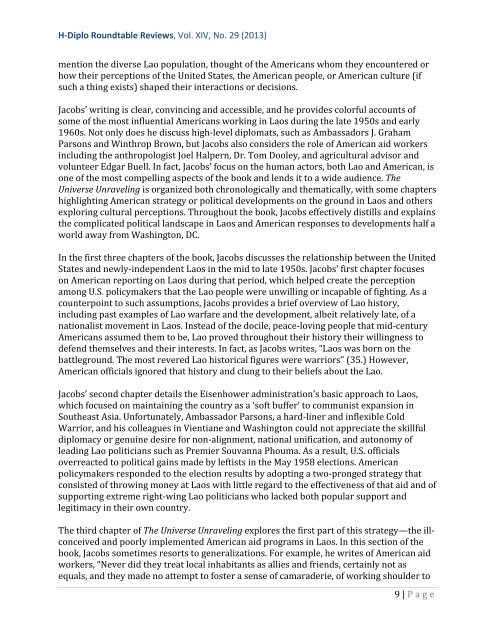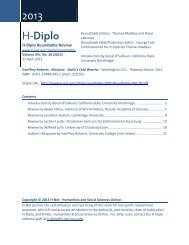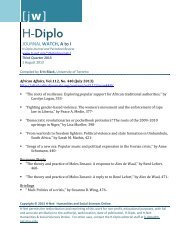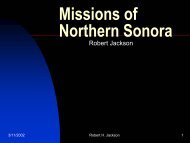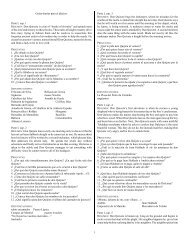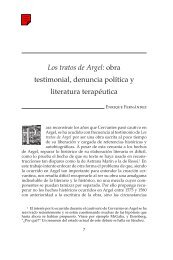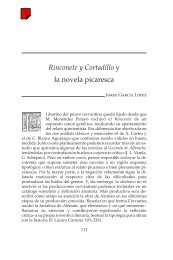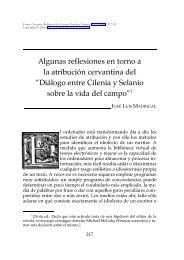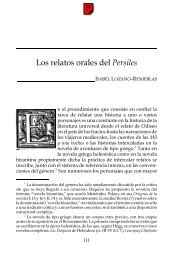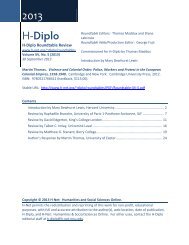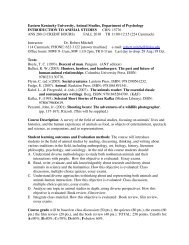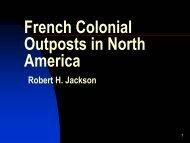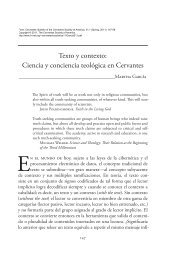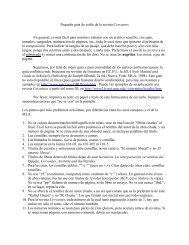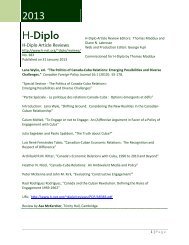H-Diplo Roundtables, Vol. XIV, No. 29 (2013) - H-Net
H-Diplo Roundtables, Vol. XIV, No. 29 (2013) - H-Net
H-Diplo Roundtables, Vol. XIV, No. 29 (2013) - H-Net
You also want an ePaper? Increase the reach of your titles
YUMPU automatically turns print PDFs into web optimized ePapers that Google loves.
H-<strong>Diplo</strong> Roundtable Reviews, <strong>Vol</strong>. <strong>XIV</strong>, <strong>No</strong>. <strong>29</strong> (<strong>2013</strong>)<br />
mention the diverse Lao population, thought of the Americans whom they encountered or<br />
how their perceptions of the United States, the American people, or American culture (if<br />
such a thing exists) shaped their interactions or decisions.<br />
Jacobs’ writing is clear, convincing and accessible, and he provides colorful accounts of<br />
some of the most influential Americans working in Laos during the late 1950s and early<br />
1960s. <strong>No</strong>t only does he discuss high-level diplomats, such as Ambassadors J. Graham<br />
Parsons and Winthrop Brown, but Jacobs also considers the role of American aid workers<br />
including the anthropologist Joel Halpern, Dr. Tom Dooley, and agricultural advisor and<br />
volunteer Edgar Buell. In fact, Jacobs’ focus on the human actors, both Lao and American, is<br />
one of the most compelling aspects of the book and lends it to a wide audience. The<br />
Universe Unraveling is organized both chronologically and thematically, with some chapters<br />
highlighting American strategy or political developments on the ground in Laos and others<br />
exploring cultural perceptions. Throughout the book, Jacobs effectively distills and explains<br />
the complicated political landscape in Laos and American responses to developments half a<br />
world away from Washington, DC.<br />
In the first three chapters of the book, Jacobs discusses the relationship between the United<br />
States and newly-independent Laos in the mid to late 1950s. Jacobs’ first chapter focuses<br />
on American reporting on Laos during that period, which helped create the perception<br />
among U.S. policymakers that the Lao people were unwilling or incapable of fighting. As a<br />
counterpoint to such assumptions, Jacobs provides a brief overview of Lao history,<br />
including past examples of Lao warfare and the development, albeit relatively late, of a<br />
nationalist movement in Laos. Instead of the docile, peace-loving people that mid-century<br />
Americans assumed them to be, Lao proved throughout their history their willingness to<br />
defend themselves and their interests. In fact, as Jacobs writes, “Laos was born on the<br />
battleground. The most revered Lao historical figures were warriors” (35.) However,<br />
American officials ignored that history and clung to their beliefs about the Lao.<br />
Jacobs’ second chapter details the Eisenhower administration’s basic approach to Laos,<br />
which focused on maintaining the country as a ‘soft buffer’ to communist expansion in<br />
Southeast Asia. Unfortunately, Ambassador Parsons, a hard-liner and inflexible Cold<br />
Warrior, and his colleagues in Vientiane and Washington could not appreciate the skillful<br />
diplomacy or genuine desire for non-alignment, national unification, and autonomy of<br />
leading Lao politicians such as Premier Souvanna Phouma. As a result, U.S. officials<br />
overreacted to political gains made by leftists in the May 1958 elections. American<br />
policymakers responded to the election results by adopting a two-pronged strategy that<br />
consisted of throwing money at Laos with little regard to the effectiveness of that aid and of<br />
supporting extreme right-wing Lao politicians who lacked both popular support and<br />
legitimacy in their own country.<br />
The third chapter of The Universe Unraveling explores the first part of this strategy—the illconceived<br />
and poorly implemented American aid programs in Laos. In this section of the<br />
book, Jacobs sometimes resorts to generalizations. For example, he writes of American aid<br />
workers, “Never did they treat local inhabitants as allies and friends, certainly not as<br />
equals, and they made no attempt to foster a sense of camaraderie, of working shoulder to<br />
9 | P age


